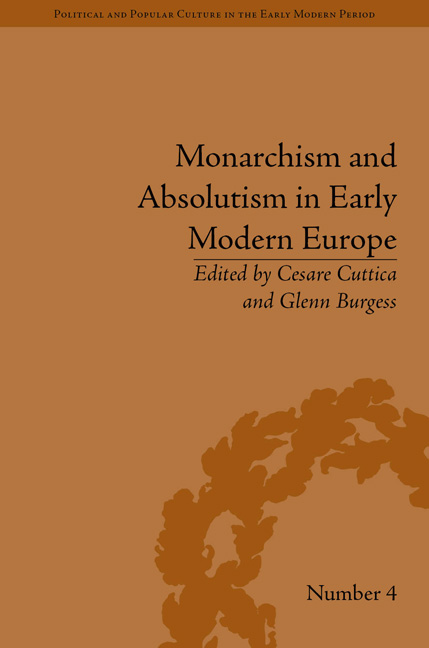Book contents
- Frontmatter
- CONTENTS
- Acknowledgements
- List of Contributors
- Introduction: Monarchism and Absolutism in Early Modern Europe
- Part I Royalists, Republicans, Patriarchalists: English Thinkers at Odds in the Seventeenth Century
- Part II Absolutism, Cynicism, Patriotism: Eighteenth-Century Enlightenment Reflections
- Part III Absolutism, Monarchism, Despotism in Theory and Practice: Contested Historiography and Comparative Approach
- 8 Early Modern Absolutism in Practice and Theory
- 9 An Absolutist Trio in the Early 1630s: Sir Robert Filmer, Jean-Louis Guez De Balzac, Cardin Le Bret and Their Models of Monarchical Power
- 10 Tyrants, Absolute Kings, Arbitrary Rulers and The Commonwealth of England: Some Reflections on Seventeenth-Century English Political Vocabulary
- Part IV Monarchy, the State of Nature, Religion and Iconography in European Perspective
- Notes
- Works Cited
- Index
9 - An Absolutist Trio in the Early 1630s: Sir Robert Filmer, Jean-Louis Guez De Balzac, Cardin Le Bret and Their Models of Monarchical Power
from Part III - Absolutism, Monarchism, Despotism in Theory and Practice: Contested Historiography and Comparative Approach
- Frontmatter
- CONTENTS
- Acknowledgements
- List of Contributors
- Introduction: Monarchism and Absolutism in Early Modern Europe
- Part I Royalists, Republicans, Patriarchalists: English Thinkers at Odds in the Seventeenth Century
- Part II Absolutism, Cynicism, Patriotism: Eighteenth-Century Enlightenment Reflections
- Part III Absolutism, Monarchism, Despotism in Theory and Practice: Contested Historiography and Comparative Approach
- 8 Early Modern Absolutism in Practice and Theory
- 9 An Absolutist Trio in the Early 1630s: Sir Robert Filmer, Jean-Louis Guez De Balzac, Cardin Le Bret and Their Models of Monarchical Power
- 10 Tyrants, Absolute Kings, Arbitrary Rulers and The Commonwealth of England: Some Reflections on Seventeenth-Century English Political Vocabulary
- Part IV Monarchy, the State of Nature, Religion and Iconography in European Perspective
- Notes
- Works Cited
- Index
Summary
Introduction
To participate in a conference on ‘absolutism’ probably implies to know whether something like absolutism existed and, if so, what it was. Far from making bold statements, this chapter will nonetheless show that a plausible answer to both questions is possible. In the first case, we say that absolutism did exist in the early modern period across Europe, at least in the heads of some people. It was articulated in treatises and polemical tracts by thinkers, clergymen, kings and politicians. Regardless of contrasts, all of these deemed that the best form of government was one where power was held in an absolute manner. Thus, even though many historians have argued more or less persuasively that absolutism in practice did not exist because of the fragmented structure of the nascent national state, it is altogether true that in the realm of ideas absolutist doctrines3 were widespread and constituted a central cultural feature of early modernity. We propose answering the second point by looking at what political writers said and how they did so. This entails recovering the plurality of languages they spoke. Hence the following pages hope to stimulate new reflections on the absolutisms informing late sixteenth- and early seventeenth-century political discourse in England and France.
The protagonists of our narrative are three interesting but often superficially studied theorists whose treatises were conceived in the early 1630s.
- Type
- Chapter
- Information
- Monarchism and Absolutism in Early Modern Europe , pp. 131 - 146Publisher: Pickering & ChattoFirst published in: 2014



